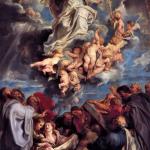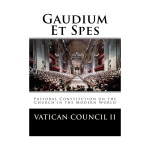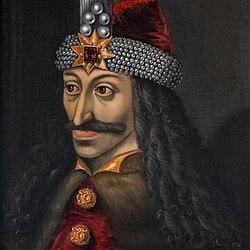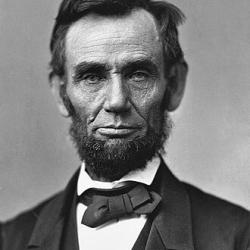Last Time on HOARATS
The Longest Pope at La Salette -1840’s
As we enter into the 1850’s
1850
Picture This
- In (1849–50)Artist John Everett Millais painted Christ in the House of His Parents which depicts the Holy Family in Saint Joseph’s carpentry workshop.
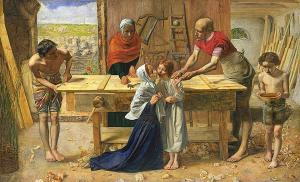
- This marvelous painting of a scene in the life of Jesus when first exhibited generated some harsh criticism from some people including the creator of A Christmas Carol. Mr. Charles Dickens remarked that the blessed mother was portrayed as an alcoholic who looks
so hideous in her ugliness that … she would stand out from the rest of the company as a Monster, in the vilest cabaret in France, or the lowest gin-shop in England.
Because of its realistic depiction of a carpentry workshop, especially the dirt and detritus on the floor and other things such as the color of Jesus’s hair, the painting was controversial. The controversy was big enough that Queen Victoria herself asked for the painting to be taken to Buckingham Palace so that she could view it in private.
News of the World
- May 23, 1850 – The USS Advance puts to sea from New York to search for Franklin’s lost expedition in the Arctic.
- May 25, 1850 – The hippopotamus Obaysch arrives at London Zoo from Egypt, the first seen in Europe since Roman times.
- July 9, 1850- Vice President Millard Fillmore becomes the 13th President of the United States upon the death of President Zachary Taylor, after eating raw fruit and iced milk aged 65.
- September 9, 1850 – California is admitted as the 31st U.S. state.
Arrivals
Mother Frances Xavier Cabrini (July 15, 1850 – December 22, 1917) is born.
Departures
William Sturgeon (May 22, 1783 – December 4, 1850) was an English physicist and inventor who made the first electromagnets, and invented the first practical electric motor.
Benedict Joseph Flaget SS (November 7, 1763 – February 11, 1850) was a French-born Catholic bishop in the United States. He served as the Bishop of the Roman Catholic Diocese of Bardstown between 1808 and 1839. When the see was transferred to Louisville in 1839, he became Bishop of the Diocese of Louisville where he served from 1839 to 1850. – American Catholic History
Publications Hot of the Press
- March 16, 1850 – Nathaniel Hawthorne‘s historical novel The Scarlet Letter is published in Boston, Massachusetts.
- August 5 – Nathaniel Hawthorne and Herman Melville meet for the first time, together with Oliver Wendell Holmes Sr. and publisher James T. Fields, on a picnic expedition to Monument Mountain (Berkshire County, Massachusetts).
- November 1 – Charles Dickens‘s novel David Copperfield – The Personal History, Adventures, Experience and Observation of David Copperfield the Younger of Blunderstone Rookery (Which He Never Meant to Publish on Any Account) – concludes serial publication and on (November 14) appears complete in book form from Bradbury and Evans in London.
Good Sports
The 16th Boat Race took place on 15 April 1859. Held annually, the event is a side-by-side rowing race between crews from the Universities of Oxford and Cambridge along the River Thames. The race went ahead following Cambridge’s request for a postponement due to extremely rough conditions being rejected. Oxford won the race after Cambridge sank. It was the first time in the history of the event that one of the crews did not finish the race.
Sanctifying Time
- April 1850 Pope Pius IX returns from exile to Rome.
- September 29 – Papal bull Universalis Ecclesiae: The Catholic hierarchy is re-established in England and Wales, by Pope Pius IX and future Pope Pius X.
The Sound of Music and Other Cultural Milestones
- August 28 (anniversary of Goethe‘s birth) – Richard Wagner‘s romantic opera Lohengrin (including the Bridal Chorus) premières under the direction of Franz Liszt at the Staatskapelle Weimar. Hans von Bülow attends and makes the decision to give up law and pursue music. His mother is convinced by two letters she receives from Liszt and Wagner.
- J S Bach – The Brandenburg Concertos published for the first time
1851
Picture This
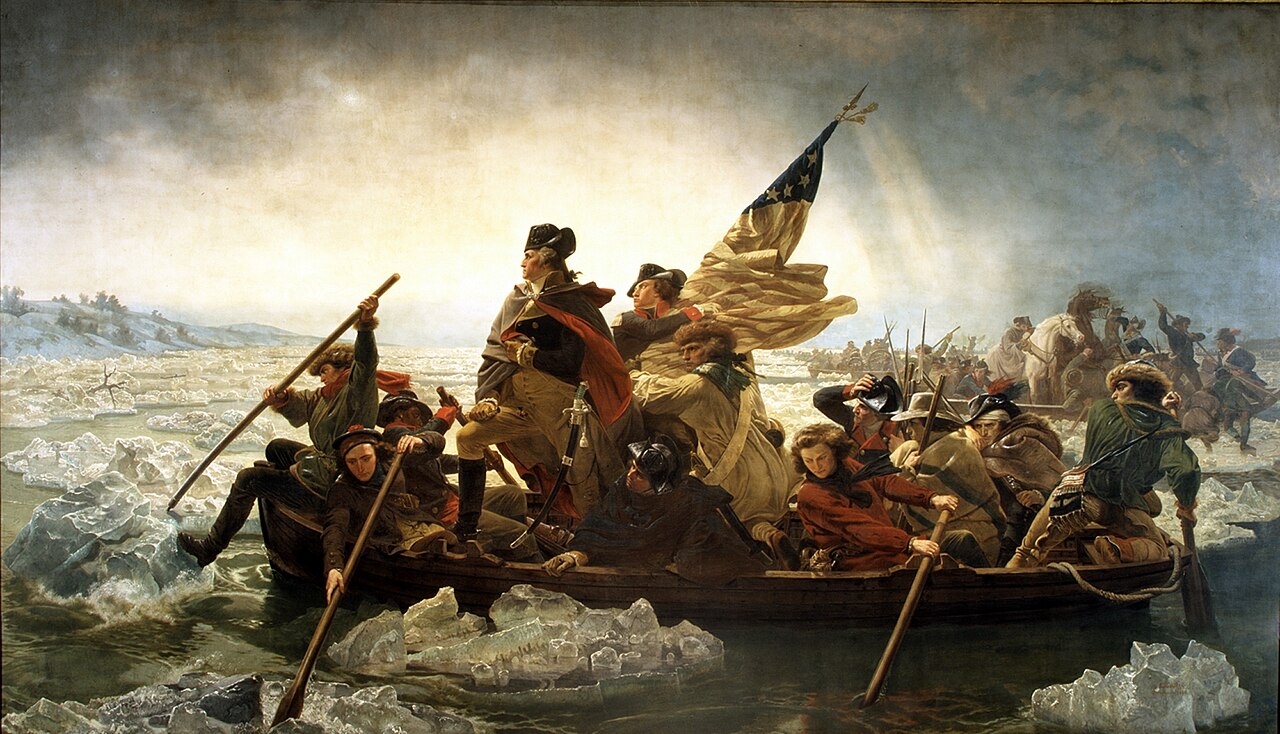
Emanuel Leutze – Washington Crossing the Delaware
News of the World
- January 23 – The flip of a coin, subsequently named the Portland Penny, determines whether a new city in the Oregon Territory is named after Boston, Massachusetts, or Portland, Maine, with Portland winning.
- April 8, 1851– Western Union is founded, as the New York and Mississippi Valley Printing Telegraph Company.
- May 21, 1851 – Slavery in Colombia is abolished.
- August 12, 1851 – Isaac Singer is granted a patent for his sewing machine.
- September 11, 1851 – Christiana Resistance: Escaped slaves led by William Parker fight off and kill a slave owner who, with a federal marshal and an armed party, sought to seize three of his former slaves in Christiana, Pennsylvania, thereby creating a cause célèbre between slavery proponents and abolitionists.
- December 9, 1851 – The first YMCA in North America is established in Montreal.
Mysterious World
- 1851 The Knights Templar – The International Organisation of Good Templars (IOGT) is founded. IOGT International works to promote the avoidance of alcohol and other drugs by supporting communities and societies around the world. Its constitution say this will lead to the liberation of peoples of the world, this leading to a richer, freer and more rewarding life. The headquarters of IOGT International is in Stockholm.The IOGT named themselves after the Knights Templar, citing the legend that the original knights “drank sour milk, and also because they were fighting ‘a great crusade’ against ‘this terrible vice’ of alcohol.”‘In Autumn, 1119 – Hugh de Payns founds the monastic order of the Knights Templar and becomes the first Grand Master. In association with Bernard of Clairvaux, a French abbot and religious leader, he creates the Latin Rule, the code of behavior of the Order. The Templars get the primary task to protect the pilgrim-routes in Palestine.
Arrivals
- July 21 – Sam Bass (July 21, 1851 ‒ July 21, 1878) was a 19th-century American train robber, outlaw, and outlaw gang leader. Notably, he was a member of a gang of six that robbed a Union Pacific train in Nebraska of $60,000 in newly minted gold from San Francisco, California. To date, this is the biggest train robbery to have been committed in the USA. He died as a result of wounds sustained in a gun battle with law enforcement officers.
- August 14 – Doc Holliday, (August 14, 1851 – November 8, 1887) was a dentist and later a gambler, gunfighter, and a close friend and associate of lawman Wyatt Earp. Holliday is best known for his role in the events surrounding and his participation in the Gunfight at the O.K. Corral in Tombstone, Arizona (d. 1887)
Departures
- Mary Shelley (August 30, 1797 – February 1, 1851) creator of Frankenstein dies.
- April 23, 1851 – Anne Darwin, daughter of Charles Darwin dies, sending him into a great depression.
- James Fenimore Cooper (September 15, 1789 – September 14, 1851) creator of the Last of the Mohicans dies.
- Eliza Hart Spalding (1807–1851) was an American missionary who joined an Oregon missionary party with her husband Henry H. Spalding and settled among the Nez Perce People called the nimiipuu in Lapwai, Idaho.
Publications Hot of the Press
- June 5, 1851 – Harriet Beecher Stowe‘s anti-slavery serial, Uncle Tom’s Cabin, or Life Among the Lowly, starts a ten-month run in the National Era abolitionist newspaper
- November 14, 1851 – Herman Melville‘s novel Moby-Dick; or, The Whale is published in full, in a single volume, for the first time, by Harper & Brothers in New York, having been previously issued on October 18 as The Whale in an abridged three-volume edition by Richard Bentley in London.
- Nathaniel Hawthorne – The House of the Seven Gables
Good Sports
- June 21 – The Immortal Game, a famous chess match, is played between Adolf Anderssen and Lionel Kieseritzky, during a break in the first international tournament, held in London.
Sanctifying Time
- Saint Hilary of Poitiers declared a Doctor of the Church
The Sound of Music and Other Cultural Milestones
- July 23 – Richard Wagner writes down the leitmotif for the “Ride of the Valkyries“
- “Old Folks at Home” (Way Down Upon the Swanee River) by Stephen Foster
1852
Picture This
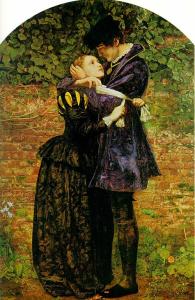
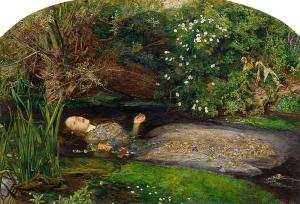
News of the World
- January 15, 1852 – Nine men representing various Jewish charitable organizations come together to form what will become Mount Sinai Hospital in New York City.
- February 11, 1852 – The first British public toilet for women opens in Bedford Street, London.
- February 14, 1852 – The Great Ormond Street Hospital for Sick Children, London, admits its first patient.
- March 18, 1852-In New York City, Henry Wells and William G. Fargo join with several other investors to launch their namesake business, today one of the world’s largest banks.
- July 5 1852 – Frederick Douglass delivers his “What to the Slave Is the Fourth of July?” speech in Rochester, New York
Arrivals
- Michael Joseph McGivney (1852–1890) was an American Catholic priest based in New Haven, Connecticut. He founded the Knights of Columbus at a local parish to serve as a mutual aid and insurance organization, particularly for immigrants and their families. It developed through the 20th century as the world’s largest Catholic fraternal organization.
- Alice Pleasance Liddell, (May 4, 1852 – November 16, 1934) inspiration for the English children’s classic Alice’s Adventures in Wonderland by Lewis Carroll (d. 1934)
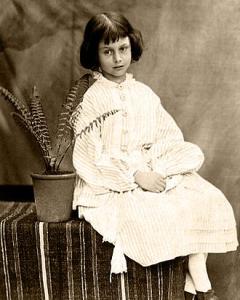
Departures
- Daniel Webster, American statesman (b. 1782) (January 18, 1782 – October 24, 1852) was an American lawyer and statesman who represented New Hampshire and Massachusetts in the U.S. Congress and served as the 14th and 19th U.S. Secretary of State under Presidents William Henry Harrison, John Tyler, and Millard Fillmore. Webster was one of the most prominent American lawyers of the 19th century, arguing over 200 cases before the United States Supreme Court in his career. During his life, Webster had been a member of the Federalist Party, the National Republican Party, and the Whig Party. He was among the three members of the Great Triumvirate along with Henry Clay and John C. Calhoun.
- Rose Philippine Duchesne, RCSJ (August 29, 1769 – November 18, 1852), was a French religious sister and educator whom Pope John Paul II canonized in 1988. A native of France, she immigrated as a missionary to America, and is recognized for her care and education of Indigenous American survivors of the United States Indian removal programs. – American Catholic History
- Ada Lovelace (December 10, 1815 – 27 November 27, 1852), English computer pioneer, daughter of Lord Byron dies.
Publications Hot of the Press
- Catharine Parr Traill – Canadian Crusoes
- April 29, 1852 – Roget’s Thesaurus, created by Peter Roget, was released to the public.
- March 20, 1852 – Harriet Beecher Stowe‘s abolitionist novel Uncle Tom’s Cabin; or, Life Among the Lowly is first published in book form, by John P. Jewett of Boston with illustrations by Hammatt Billings, rapidly establishing its position as the best-selling novel of the 19th century.
Good Sports
- August 3, 1852— The first Harvard–Yale Regatta is a 2-length win for Harvard in a single eight-oar, two-mile race on Lake Winnipesaukee, New Hampshire. The Yale club initiated this Race, and the next one in 1855, by challenge to the Harvard club.
- August 22, 1852 – The yacht America wins the first America’s Cup race, off the coast of England.
Sanctifying Time
The Sound of Music and Other Cultural Milestones
- March 13 1852-Uncle Sam makes his debut in the New York Lantern weekly magazine.

S.M. Grannis – “Do They Miss Me At Home?” (lyrics by Carolina A.Mason)
1853
Picture This
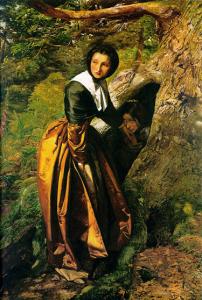
John Everett Millais –The Proscribed Royalist, 1651
News of the World
- March, 1853 – The clothing company Levi Strauss & Co. is founded in the United States.
- March 4, 1853 – Inauguration of Franklin Pierce as 14th President of the United States (his only child was killed in a train accident on January 6).
- 1853 – Werewolves! Manuel Blanco Romasanta (November 18, 1809 – December 14, 1863) was Spain’s first recorded serial killer. He admitted to thirteen murders, but claimed he was not responsible because he was suffering from a curse that caused him to turn into a wolf. Although this defense was rejected at trial, Queen Isabella II commuted his death sentence to allow doctors to investigate the claim as an example of clinical lycanthropy. Blanco has become part of Spanish folklore as the Werewolf of Allariz and is also known as The Tallow Man, a nickname he earned for rendering his victims’ fat to make high-quality soap.
Arrivals
- Howard Pyle (March 5, 1853 – November 9, 1911) was an American illustrator, painter, and author, primarily of books for young people. He was a native of Wilmington, Delaware, and he spent the last year of his life in Florence, Italy.
- Vincent van Gogh, (March 30, 1853 – July 29, 1890) was a Dutch Post-Impressionist painter who is among the most famous and influential figures in the history of Western art.
Departures
- Venerable Félix Varela – (November 20, 1788 – February 18, 1853) was a Cuban Catholic priest and independence leader who is regarded as a notable figure in the Catholic Church in both his native Cuba and the United States, where he also served.
- Fr. Stephen Badin (July 17, 1768 – April 21 ,1853) was the first Catholic priest ordained in the United States. He spent most of his long career ministering to widely dispersed Catholics in Canada and in what became the states of Kentucky, Ohio, Indiana, Michigan, and Illinois.
- Venerable Pierre Toussaint (June 27, 1766 – June 30, 1853) was a formerly enslaved Haitian-American hairdresser and philanthropist, brought to New York City by his enslavers in 1787. American Catholic History
- Abigail Fillmore, First Lady of the United States March 13, 1798 – March 30, 1853), wife of President Millard Fillmore, was the first lady of the United States from 1850 to 1853.
Publications Hot of the Press
- December 27 – Charles Dickens gives the first of his public readings of his own works, in Birmingham Town Hall (England) to the Industrial and Literary Institute, repeated three days later to an audience of working people and including an adaptation of A Christmas Carol; these are very successful and Dickens continues public readings until the year of his death.
Good Sports
12 October, 1853 — Yankee Sullivan and John Morrissey meet to decide the Heavyweight Championship of America at Boston Corners, New York. According to reports, Morrissey is “badly beaten” but Sullivan leaves the ring after the 37th round and ignores the call of “time”. As a result, the referee awards the fight to Morrissey, who holds the American Championship until 1859. Sullivan does not fight again but is subsequently arrested in San Francisco and sent to jail.
Sanctifying Time
The Sound of Music and Other Cultural Milestones
1854
Picture This
The Light of the World (1851–1854) is an allegorical painting by the English Pre-Raphaelite artist William Holman Hunt (1827–1910).
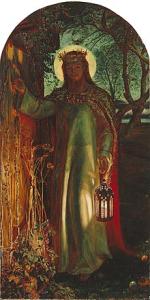
News of the World
- 1854– Vice-Admiral Sir Robert John Le Mesurier McClure CB (28 January 1807 – 17 October 1873) was an Irish explorer who explored the Arctic. In 1854 he traversed the Northwest Passage by boat and sledge, and was the first to circumnavigate the Americas.
- 1854 – The Knights of the Golden Circle The Knights of the Golden Circle (KGC) was a secret society founded in 1854 by American George W. L. Bickley, the objective of which was to create a new country, known as the Golden Circle where slavery would be legal. The country would have been centered in Havana and would have consisted of the Southern United States and a “golden circle” of territories in Mexico (which was to be divided into 25 new slave states), Central America, northern parts of South America, and Cuba, Haiti, Dominican Republic, and most other islands in the Caribbean, about 2,400 miles (3,900 km) in diameter.
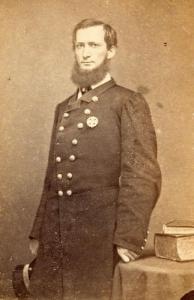
- February 11 – Major streets are lit by coal gas for the first time by the San Francisco Gas Company; 86 such lamps are turned on this evening in San Francisco, California.
- February 14 – Texas is linked by telegraph with the rest of the United States, when a connection between New Orleans and Marshall, Texas is completed.
- February 24, 1854 – A Penny Red with perforations becomes the first perforated postage stamp to be officially issued for distribution.
- March 24 – Slavery is abolished in Venezuela.
- March 20 – In the United States:
- The Boston Public Library opens to the public.
- The Republican Party is formed by anti-slavery opponents of the Kansas–Nebraska Act in Ripon, Wisconsin.
- May 18 – The Catholic University of Ireland (forerunner of University College Dublin) is founded.
- May 30 – The Kansas–Nebraska Act becomes law (replacing the Missouri Compromise of 1820), creating the Kansas Territory and the Nebraska Territory, west of the State of Missouri and the State of Iowa. The Kansas–Nebraska Act also establishes that these two new Territories will decide either to allow or disallow slavery, depending on balloting by their residents (these areas would have been strictly “free territory” under the Missouri Compromise, which allowed slavery in the State of Missouri but disallowed it in any other new state north of latitude 36° 30′, which forms most of the southern boundary of Missouri. This prohibition of slavery extended all the way from the western boundary of Missouri to the Pacific Ocean).
- July 6-In Jackson, Michigan, the first convention of the U.S. Republican Party is held.
- July 16, 1854, teacher Elizabeth Jennings refused to get off a NY streetcar when told to by the conductor. She was forcibly removed & left with her “bonnet smashed and her dress soiled”. Jennings took the streetcar company to court & won for desegregation.
- October 1 – The watch company founded in 1850 in Roxbury, Massachusetts, by Aaron Lufkin Dennison, relocates to Waltham, to become the Waltham Watch Company, pioneer in the American system of watch manufacturing.
- November- Florence Nightingale and her team of 38 trained volunteer nurses, having set out on October 21 from England, arrive at Selimiye Barracks in Scutari in the Ottoman Empire, to care for British Army troops invalided from the Crimean War.
- December 10th – Sa’id Pasha officially abolishes slavery in Egypt.
Arrivals
- Oscar Wilde (16 October 1854 – 30 November 1900) author of The Picture of Dorian Grey and The Selfish Giant.
- Sybil Fenton Newall (17 October 1854 – 24 June 1929), best known as Queenie Newall, was an English archer who won the gold medal at the 1908 Summer Olympics in London.
Departures
- Elizabeth Schuyler Hamilton, (August 9, 1757 – November 9, 1854) philanthropist, wife of Alexander Hamilton
- Thomas Campbell (February 1, 1763 – January 4,1854) dies. He was a Presbyterian minister who became prominent during the Second Great Awakening of the United States. Born in County Down, he began a religious reform movement on the American frontier. He was joined in the work by his son, Alexander. Their movement, known as the “Disciples of Christ”, merged in 1832 with the similar movement led by Barton W. Stone to form what is now described as the American Restoration Movement (also known as the Stone-Campbell Restoration Movement).

Publications Hot of the Press
- April 1 – August 12 – Charles Dickens‘s novel Hard Times, is serialised in his magazine Household Words.[2] From September 2, it is followed in the magazine by Elizabeth Gaskell‘s North and South, another social novel based in the Lancashire manufacturing district.
- Maria Cummins – The Lamplighter
- Leo Tolstoy – Boyhood («Отрочество», Otrochestvo) In November – Leo Tolstoy arrives to take part as a defending soldier in the Siege of Sevastopol (1854–55).Off-duty he is reading Thackeray‘s novels in French translation.
- Henry David Thoreau – Walden, or Life in the Woods
Good Sports
- Baseball The Knickerbockers adopt some rule changes agreed in conference by their delegates with those of the Gothams and Eagles.
Sanctifying Time
- December 8, 1854 – Pope Pius IX in the apostolic constitution Ineffabilis Deus defines ex Cathedra the dogma of Immaculate Conception, which holds that the Blessed Virgin Mary was conceived without original sin.
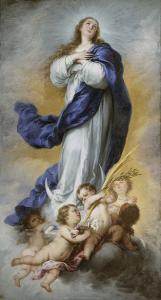
The Sound of Music and other Cultural Milestones
- January 6 – The fictional detective Sherlock Holmes is perhaps born.
“(I Dream of) Jeanie With the Light Brown Hair” w.m. Stephen Collins Foster
1855
Picture This
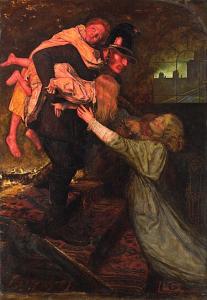
News of the World
- January 27,1855 – The Panama Railway becomes the first railroad to connect the Atlantic and Pacific Oceans.
- June 29, 1855 – The Daily Telegraph newspaper begins publication in London.
- August 6, 1855 – Election Day on this date is known as Bloody Monday in Louisville, Kentucky. The Know Nothings used violence to try to keep Catholics from voting, and the violence turned into riots. By the end of the day 22 were confirmed dead, though the number of dead was likely over 100. Learn more about this awful day in Louisville, which played a role in Louisville falling behind other cities along the Ohio and Mississippi rivers, like Cincinnati and St. Louis, in terms of population and economic importance. American Catholic History
- November 17, 1855 – Scottish missionary explorer David Livingstone becomes the first European to see Victoria Falls, in modern-day Zambia–Zimbabwe.
Mysterious World
- February 8–9, 1855 – The Devil’s Footprints was a phenomenon that occurred around the Exe Estuary in East and South Devon, England. After a heavy snowfall, trails of hoof-like marks appeared overnight in the snow covering a total distance of some 40 to 100 miles (60 to 160 km). The footprints were so called because some persons suggested that they were the tracks of Satan and made comparisons to a cloven hoof. Many theories have been made to explain the incident, and some aspects of its veracity have also been questioned.
Arrivals
- Flora Haines Loughead, 1855–1943) was an American writer, farmer, and miner from Wisconsin. She became the “Opal Queen” of Virgin Valley. Flora’s son, Allan was the founder of American aerospace company the Lockheed Corporation.American miner; mother of Allan Lockheed, founder of Lockheed aerospace company.
- John Browning (January 23, 1855 – November 26, 1926) was an American firearm designer who developed many varieties of military and civilian firearms, cartridges, and gun mechanisms, many of which are still in use around the world. He made his first firearm at age 13 in his father’s gun shop and was awarded the first of his 128 firearm patents on October 7, 1879, at the age of 24. He is regarded as one of the most successful firearms designers of the 19th and 20th centuries and a pioneer of modern repeating, semi-automatic, and automatic firearms.
Departures
- Charlotte Brontë, 21 April 21, 1816 – 31 March 31, 1855) was an English novelist and poet, the eldest of the three Brontë sisters who survived into adulthood and whose novels became classics of English literature. She is best known for her novel Jane Eyre, which she published under the androgynous name Currer Bell. Jane Eyre went on to become a success in publication, and is widely held in high regard in the gothic fiction genre of literature.
- Søren Kierkegaard, (May 5, 1813 – 11 November 11, 1855) Danish philosopher dies.
- In Washington, DC in 1824, Ann Carbery Mattingly (1784-1855) , a Catholic widow, suffered terribly from a debilitating and horribly painful cancer. A priest friend who came to her bedside wrote to a German priest who was known as a miracle worker. Many trans-Atlantic letters later, Mass was offered at the same time and specific prayers were prayed over Mrs. Mattingly, and suddenly her cancer, and pain, were gone. – American Catholic History
Publications Hot of the Press
- November 10, 1855 – Henry Wadsworth Longfellow‘s fictional poem The Song of Hiawatha is published in Boston.
Good Sports
- It is about this time that pucks are introduced to the game in Canada in place of balls.
Sanctifying Time
The Sound of Music and Other Cultural Milestones
- words Septimus Winner (as “Alice Hawthorne”) music Richard Milburn – “Listen to the Mocking Bird“
1856
Picture This
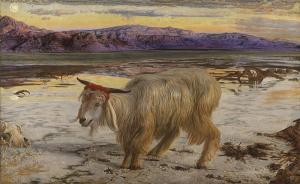
William Holman Hunt – The Scapegoat (large version)
News of the World
- February 18, 1856 – The American Know Nothing Party convenes in Philadelphia to nominate their first Presidential candidate, former President Millard Fillmore.
- May 22, 1856 – Caning of Charles Sumner: United States Congressman Preston Brooks of South Carolina beats Senator Charles Sumner with a cane in the hall of the United States Senate for a speech Sumner had made attacking pro-slavery Southerners, especially elderly South Carolina Senator Andrew Butler, a relative of Brooks. Sumner is unable to return to duty for three years while he recovers; Brooks becomes a hero across the South.
- November 4, 1856– 1856 United States presidential election: Democrat James Buchanan defeats former President Millard Fillmore, representing a coalition of Know Nothings and Whigs, and John C. Frémont of the fledgling Republican Party, to become the 15th President of the United States.
- 1856 – Gregor Mendel, starts his research on genetics.
- 1856 – Kate Warne,1856 the first female private detective, begins to work for the Pinkerton Detective Agency.
Mysterious World
Arrivals
- Booker T. Washington, (April 5, 1856 – November 14, 1915) was an American educator, author, and orator. Between 1890 and 1915, Washington was the primary leader in the African-American community and of the contemporary Black elite.
- L. Frank Baum, (May 15, 1856 – May 6, 1919) was an American author best known for his children’s fantasy books, particularly The Wonderful Wizard of Oz, part of a series. In addition to the 14 Oz books, Baum penned 41 other novels (not including four lost, unpublished novels), 83 short stories, over 200 poems, and at least 42 scripts. He made numerous attempts to bring his works to the stage and screen; the 1939 adaptation of the first Oz book became a landmark of 20th-century cinema.
Departures
- Anne-Thérèse Guérin (Mother Théodore) (October 2, 1798 –May 14, 1856), designated by the Vatican as Saint Theodora dies. She was a French-American saint and the foundress of the Sisters of Providence of Saint Mary-of-the-Woods, a congregation of Catholic sisters at Saint Mary-of-the-Woods, Indiana.
- Henry Bishop (composer) (November 18, 1787 – April 30, 1856) dies. He is most famous for the songs “Home! Sweet Home!” and “Lo! Hear the Gentle Lark.” He was the composer or arranger of some 120 dramatic works, including 80 operas, light operas, cantatas, and ballets.
Publications Hot of the Press
- Herman Melville The Piazza Tales
- Leo Tolstoy – Youth («Юность», Yunost’)
- Gustave Flaubert – Madame Bovary (serialization)
Good Sports
- The Montreal Lacrosse Club is formed in Montreal by W. George Beers, the first organised lacrosse team. They also develop the first codified rules of lacrosse, which Beers will rewrite in 1867.
Sanctifying Time
The Sound of Music and Other Cultural Milestones
- January 27 ,1856– In recognition of Wolfgang Amadeus Mozart‘s 100th birthday, Franz Liszt conducts a concert of his music in Vienna.
- March 23 ,1856– Richard Wagner completes the score of Die Walküre.
1857
Picture This
- Jean-François Millet (both Musée d’Orsay, Paris)
- The Angelus (original version)
- The Gleaners
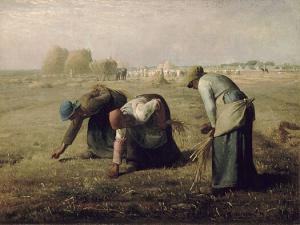
News of the World
- March 4, 1857 – James Buchanan is sworn in as the 15th President of the United States.
- March 6, 1857 – Dred Scott v. Sandford: The Supreme Court of the United States rules that blacks are not citizens and slaves can not sue for freedom, driving the U.S. further towards the American Civil War (the ruling is not overturned until the 14th Amendment is adopted in 1868).
- December 31, 1857 – Queen Victoria chooses Ottawa, then a small logging town, as the capital of the Province of Canada.
Mysterious World
January 1857 – Death at the National Hotel! The National Hotel epidemic was a mysterious sickness that began to afflict persons who stayed at the National Hotel in Washington, DC. At the time, the hotel was the largest in the city. By some accounts, as many as 400 people became sick, and nearly three dozen died. President-elect James Buchanan is included in those who got violently sick.
Arrivals
- Joseph Conrad (December 3, 1857 – August 3, 1924) Polish-born English novelist and story writer.
- Pope Pius XI (May 31, 1857 – February 10, 1939), was the Bishop of Rome and supreme pontiff of the Catholic Church from February 6, 1922 to February 10, 1939. He also became the first sovereign of the Vatican City State upon its creation as an independent state on February 11, 1929. He remained head of the Catholic Church until his death in February 1939. His papal motto was “Pax Christi in Regno Christi”, translated as “The Peace of Christ in the Reign of Christ”.
Departures
- Saint Dominic Savio (April 2, 1842 –March 9, 1857: Aged 14) dies.
- John McLoughlin, (October 19, 1784 – September 3, 1857) was a French-Canadian, later American, Chief Factor and Superintendent of the Columbia District of the Hudson’s Bay Company at Fort Vancouver from 1824 to 1845. He was later known as the “Father of Oregon” for his role in assisting the American cause in the Oregon Country. In the late 1840s, his general store in Oregon City was famous as the last stop on the Oregon Trail.
- John McLoughlin (October 19, 1784 – September 3, 1857) was a French-Canadian, later American, Chief Factor and Superintendent of the Columbia District of the Hudson’s Bay Company at Fort Vancouver from 1824 to 1845. He was later known as the “Father of Oregon” for his role in assisting the American cause in the Oregon Country. In the late 1840s, his general store in Oregon City was famous as the last stop on the Oregon Trail. – American Catholic History
Publications Hot of the Press
- April 18, 1857 – The Spirits’ Book (Le Livre des Esprits), one of the Five Fundamental Works of Spiritism, is published by French educator Allan Kardec.
- Thomas Hughes – Tom Brown’s Schooldays
- R. M. Ballantyne – The Coral Island
- David Livingstone – Missionary Travels and Researches in South Africa
Good Sports
- October 24, 1857-Sheffield F.C., the world’s first association football team, is founded in Sheffield, United Kingdom.
Sanctifying Time
The Sound of Music and Other Cultural Milestones
- “Jingle Bells w.m. James Pierpont originally published as “One Horse Open Sleigh”
- 1857 – Mysteries of the Magi The song “We Three Kings” is a Christmas carol that was written by John Henry Hopkins Jr.. At the time of composing the carol, Hopkins served as the rector of Christ Episcopal Church in Williamsport, Pennsylvania, and he wrote the carol for a Christmas pageant in New York City. It was the first widely popular Christmas carol written in America.
1858
Picture This
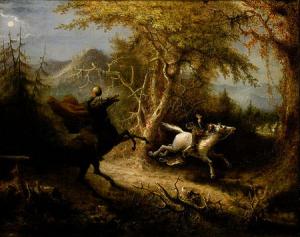
John Quidor – The Headless Horseman Pursuing Ichabod Crane
News of the World
- April 10 1858 – After the original Big Ben, a 14.5 tonnes (32,000 lb) bell for the Palace of Westminster, had cracked during testing, it is recast into the current 13.76 tonnes (30,300 lb) bell by Whitechapel Bell Foundry.
- May 11, 1858 – Minnesota is admitted as the 32nd U.S. state.
- June 23, 1858 – Police of the Papal States seize Jewish boy Edgardo Mortara, and take him away to be raised as a Catholic.
- July 16, 1858– Abraham Lincoln delivers his House Divided speech in Springfield, Illinois.
- July 18, 1858– Charles Darwin receives a paper from Alfred Russel Wallace that includes nearly identical conclusions about evolution as Darwin’s own, prompting Darwin to publish his theory.
- August 16, 1858 – U.S. President James Buchanan inaugurates the new trans-Atlantic telegraph cable, by exchanging greetings with Queen Victoria. However, a weak signal forces a shutdown of the service in a few weeks.
- August 21, 1858 – The first of the Lincoln–Douglas debates is held in Illinois.
Arrivals
- Saint Charles de Foucauld (September 15, 1858 – December 1,1916), commonly known as Charles de Foucauld, was a French soldier, explorer, geographer, ethnographer, Catholic priest and hermit who lived among the Tuareg people in the Sahara in Algeria. He was assassinated in 1916. His inspiration and writings led to the founding of a number of religious communities inspired by his example, such as the Little Brothers of Jesus.
- Theodore Roosevelt, Theodore Roosevelt Jr. (October 27, 1858 – January 6, 1919) 26th President of the United States, recipient of the Nobel Peace Prize.
- Emmeline Pankhurst, (July 15, 1858 – June 14, 1928) English suffragette, mother of Christabel, Sylvia and Adela Pankhurst
Departures
- Dred Scott, (c. 1799 – September 17, 1858) was an enslaved African American man who, along with his wife, Harriet, unsuccessfully sued for the freedom of themselves and their two daughters, Eliza and Lizzie, in the Dred Scott v. Sandford case of 1857, popularly known as the “Dred Scott decision”. The Scotts claimed that they should be granted freedom because Dred had lived in Illinois and the Wisconsin Territory for four years, where slavery was illegal, and laws in those jurisdictions said that slave holders gave up their rights to slaves if they stayed for an extended period.
- Karl Thomas Mozart (September 21, 1784 – October 31, 1858) dies. He was the second son and the elder of the two surviving sons of Wolfgang and Constanze Mozart. The other was Franz Xaver Wolfgang Mozart.
- Catherine Spalding (December 23, 1793 – March 20, 1858) was an American educator who was a co-founder and longtime mother superior of the Sisters of Charity of Nazareth. She pioneered education, health services and social services for girls and orphans in Louisville and other Kentucky cities. On January 6, 2003, the Louisville Courier-Journal named Spalding as the only woman among sixteen “most influential people in Louisville/Jefferson County history. American Catholic History
Publications Hot of the Press
Good Sports
20 October — John Morrissey at last defends the Championship of America at Long Point in Canada against John C. Heenan. Heenan breaks two knuckles early in the fight which ends after the 11th round with Heenan unable to continue.
Sanctifying Time
February 11, 1858 – Pauper girl Bernadette Soubirous of Lourdes, fourteen, has a vision at the grotto of Massabielle, the first in a series of eighteen events which will come to be regarded as Marian apparitions.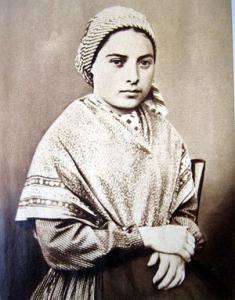
The Sound of Music and Other Cultural Milestones
- October 15 – The farce Our American Cousin by the English playwright Tom Taylor is first performed at Laura Keene’s Theatre in New York City, with the American Joe Jefferson in the title rôle and the English actor Edward Askew Sothern as Lord Dundreary.
- January 25, 1858 – The Wedding March by Felix Mendelssohn is played at the marriage of Queen Victoria‘s daughter, Victoria, and Friedrich of Prussia, and becomes a popular wedding processional.
1859
Picture This
The painting called the Angelus by Jean-François Millet is completed.
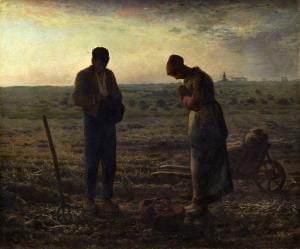
Francesco Hayez – The Kiss, an expression of Italian Romanticism.
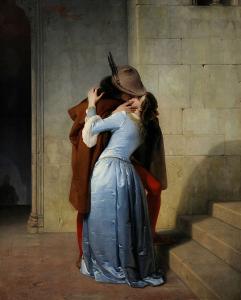
News of the World
- May 31, 1859 – The clock tower at the Houses of Parliament, which houses Big Ben, starts keeping time.
- April 25, 1859 – British and French engineers break ground for the Suez Canal.
- June 6, 1859– Queensland is established as a separate colony from New South Wales. The date is still celebrated as Queensland Day.
- June 30, 1859– French acrobat Charles Blondin crosses Niagara Falls on a tightrope.
- July 5, 1859 – The United States discovers and claims Midway Atoll.
- September 17, 1859– First American Emperor Joshua Abraham Norton (February 4, 1818 –January 8, 1880), known as Emperor Norton, was a resident of San Francisco, California who in 1859 proclaimed himself “‘Norton I., Emperor of the United States”. In 1863, after Napoleon III invaded Mexico, he took the secondary title of “Protector of Mexico”.
- October 16, 1859 – John Brown leads a raid on Harpers Ferry, Virginia.
- December 22, 1859: The Lost Planet Vulcan French astronomer and mathematician Urbain Le Verrier receives a letter from amateur astronomer Dr. Edmond Modeste Lescarbault . Dr. Edmond writes that he had seen a transit of a hypothetical planet on March 26 of that year. Le Verrier took the train to the village of Orgères-en-Beauce, some 70 kilometres (43 mi) southwest of Paris, to Lescarbault’s homemade observatory. Le Verrier arrived unannounced and proceeded to interrogate the man about the theorized planet named Vulcan. This planet apparently had an orbit between Mercury and the Sun.
Arrivals
- Wind in the Willows author Kenneth Grahame, (March 8,1859 – 6 July 6,1932) is born.
Sherlock Holmes creator Arthur Conan Doyle, (May 22, 1859 – 7 July 7,1930) is also born. - Departures
- Wilhelm Carl Grimm (February 24, 1786 – 16 December 16, 1859) was the younger brother of Jacob Grimm, of the literary duo the Brothers Grimm.
- Washington Irving (April 3, 1783 – November 28, 1859) author of the short stories “Rip Van Winkle” (1819) and “The Legend of Sleepy Hollow” (1820), both of which appeared in his collection The Sketch Book of Geoffrey Crayon, Gent.
Publications Hot of the Press
- April 30 – Charles Dickens‘s weekly magazine All the Year Round is published for the first time in London, succeeding Household Words and containing the first serial installment of his historical novel A Tale of Two Cities.
- November 26 – Wilkie Collins‘s The Woman in White, an early example of mystery fiction, begins serialisation in All the Year Round.
- Charles Darwin – On the Origin of Species
- Edgar Allen Poe (July 4, 1858- March 26,1940) turns 1 year old. EAP turns 1? What? He died a decade ago.
Good Sports
- 7 September — departure of cricket’s first-ever touring team. The team of English professionals went to North America and played five matches, winning them all. There were no first-class fixtures. A famous photograph was taken on board ship before they sailed from Liverpool (see above).
Sanctifying Time
- Adele Brise sees apparitions of the Virgin Mary in October 1859 in Wisconsin U.S.A.. The apparition was formally approved, becoming the first Marian apparition approved by the Catholic Church in the United States
- October 8, 1859 – Our Lady of Good Help In Champion Wisconsin Visionary Belgium immigrant Adele Brise sees an apparition of the Blessed Virgin Mary for the 2nd time. On December 8, 2010 Bishop David L. Ricken approves Our Lady of Champion making it the first and only apparition approved by the Catholic Church in the United States.
- John Bosco founds the Salesians.
- Billy The Kid, christened “Patrick Henry McCarthy” at St. Peter’s church in Manhattan on September 28, 1859.
- The Salesians of Don Bosco (SDB) is a religious congregation of men in the Catholic Church, founded in 1859 by the Italian priest John Bosco to help poor and migrant youngsters during the Industrial Revolution. The congregation was named after Francis de Sales, a 17th-century bishop of Geneva.
The Sound of Music and Other Cultural Milestones
Near the Cross – Acapella Hymn
Lyrics by: Fanny Crosby 1844-1915
Music by: William H. Doane 1832-1915
This selection comes from the Psalms and Hymns and Spiritual Songs hymnal by Melody Publications
Original Song from Winnowed Hymns- A Collection of Sacred Songs, Especially Adapted for Revivals, Prayer and Camp Meetings (1873)
Fanny Crosby (March 24, 1820 – February 12, 1915) was the “Queen of Gospel Song Writers”. This blind methodist woman wrote more than 8,000 hymns and gospel songs, with more than 100 million copies printed. In 1859,Fanny and her husband Alexander van Alstynes had a daughter named Frances who died in her sleep soon after birth. Some believe that the cause was typhoid fever, although Darlene Neptune speculates that it may have been SIDS, and that Crosby’s hymn “Safe in the Arms of Jesus” was inspired by her death
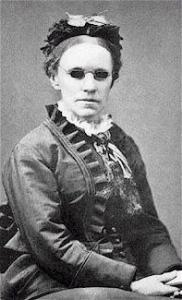
Next Time on
HOARATS
The Civil War Years in Wonderland- 1860 – 1869
To Understand
What I love and How I Write About History
Hit the Link Above.
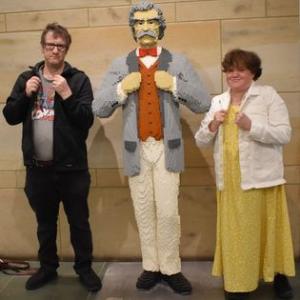
To understand about this particular series I’m writing about, please read
The Catholic Bard’s Guide To History Introduction
And to view a historical article click on


